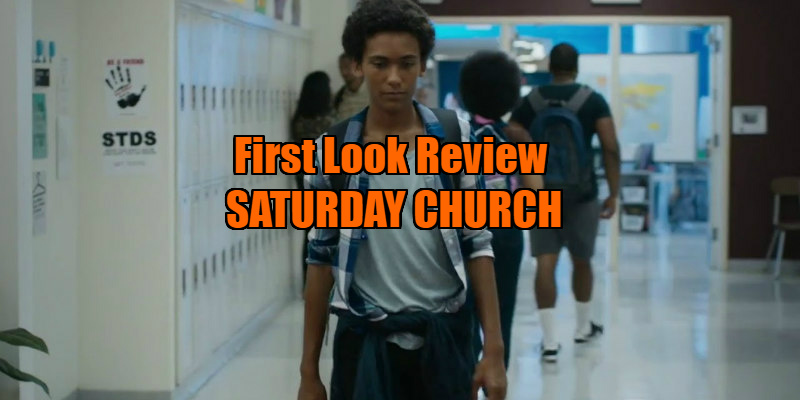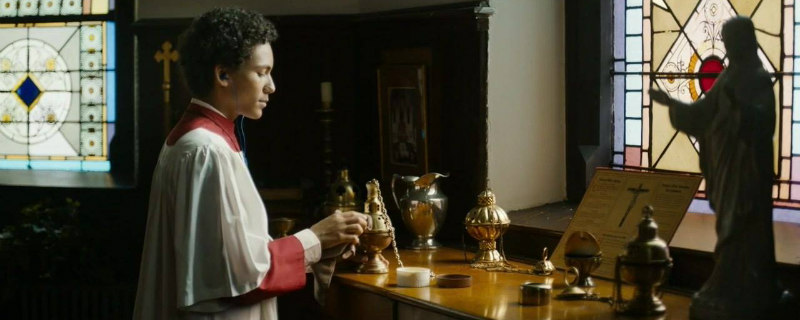
Review by Benjamin Poole
Directed by: Damon Cardasis
Starring: Luka Cain, Margot Bingham, Regina Taylor, Evander Duck Jr

Saturday Church, writer/director Damon Cardasis’ superb melodrama-come-musical, sets out its disconsolate tone early with the funeral of 15 year old lead character Ulysses’ (Luka Kain) father. In this film concerned with notions of masculinity, the passing of Ulysses’ dad, who was a military man no less, has left a vacancy in this (black, working class) family for a male head of household. Stepping up to help his mum with the bills and looking after his younger brother would be a tough call for any adolescent, but Ulysses is already struggling with his burgeoning homosexuality, and the ensuing intolerance and confusion which it induces.

In the early stages of Saturday Church, Cardasis affects a gentle, unhurried storytelling style which portrays Ulysses’ miserable life in sober detail. There is a simple poetry in the visuals of linked hands and bereft glances which express the mourning at home, before moving on to the teasing from Ulysess’ little brother (‘Mom and Dad told you not to wear Mom’s clothes’- line of the year so far), the misguided anger of his aunt and the extreme bullying of jocks at school. These meatheads, who are another stereotype of hegemonic masculinity, take to stuffing ‘fairy’ Ulysses’ P.E. kit down the toilet and pissing on it. To process such misery, Ulysses withdraws into fantasy: reimagining such circumstances as musical sequences, which we witness as fully choreographed and fully throated showstoppers. Thus, the jocks flock and swoon at Ulysses, eventually carrying him aloft on their shoulders: yaaas queen!
These conflicting styles - social realism and the high, dramatic camp of the musical interludes - are never gimmicky, and instead are expressive of that most human and powerful of resources; imagination. Ulysses’ fantasies may be naïve, but they are all he has. Ulysses’ creativity extends to his predilection for cross dressing too; like his surroundings, his body and self become a canvas with exciting possibilities, none of which match the colour-within-the-lines images of masculinity that society has prescribed for boys his age. Back in grey reality, Ulysses hangs around outside bars festooned with rainbow flags, following the flashy club kid clientele as they exit to NY’s underground gay areas. Cardasis (himself a gay New Yorker) suggests that in the absence of any familial support, this is where young gay boys and men are forced to find solace: in the fringes, the dock areas where trans sex workers and ‘cracked out queens’ ply their trade.

It’s fortunate, then, that these tarts have hearts, and take Ulysses under their shimmering wings and to the Saturday Church, a weekly community programme for LGBTQ kids. Herein Ulysses discovers the joys of the NY ball scene, voguing (!) and make up. Why not? Pretty Kain has the cheekbones for it, and also gives a wide eyed, poignant performance which further imbues this beautiful film with heart and soul. As the film goes on, we see Ulysses enter into a cutely tentative relationship with a lad his age, and build the courage/save the cash to buy himself a pair of to-die-for boots. Like his classical namesake, Ulysses has taken a tempestuous journey of discovery.
All too often, this sort of issue based, identity politics narrative falls into chin stroking misery, but refreshingly Cardasis chooses instead to celebrate Ulysses coming-out of age, with the musical numbers increasingly used as triumphant accompaniment to his belonging and self-actualisation. However, while the emphasis is on joy, there are still persistent dangers within this world: the pain in the arse aunt who discovers Ulysses’ boots and throws him out, the ostensibly kindly middle-class gentleman who takes Ulysses in but who turns out to be a predatory paedophile. Crucially, the usually optimistic Saturday Church doesn’t skimp on the heart-breaking reality of the situation for kids like Ulysses. The aunt outlines part of the problem: ‘He’s a black boy and he’s gay’, implying that what Ulysses is predestines who he can be, and that young black men are already viewed within negative, narrowly defined parameters by the world at large.

During one of Saturday Church’s more upbeat sequences the scheme hosts a party, wherein various denizens break dance and shimmy to a looped beat that an MC raps over. It reminded me of my beloved hiphop’s early days, a melting pot of varied ethnicities and styles, a working class spin off from the city’s fertile disco scene, wherein pioneers like Bambaataa would dress up like shiny peacocks, before the corporate domination of the genre resulted in the limited masculine stereotypes of today: I’m richer, more violent and more heterosexual than you (yawn). Saturday Church has no time for such boundaries, and in the film’s epiphanic ending, we witness Ulysses transubstantiated from a meek boy to confident man in full, butterfly glory.

Saturday Church is in US cinemas and VOD January 12th. A UK/ROI releases has yet to be announced.

